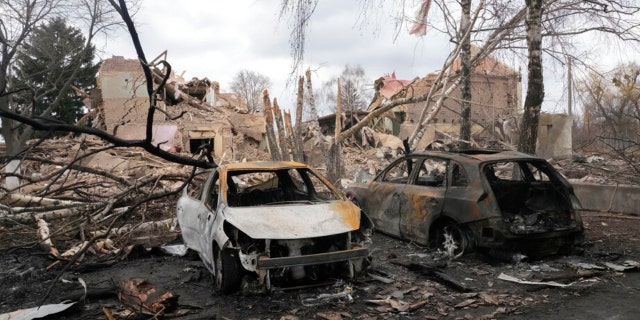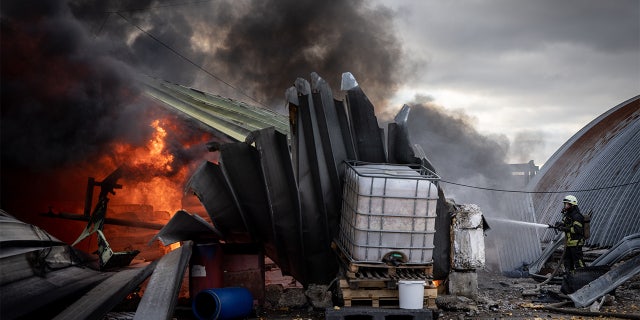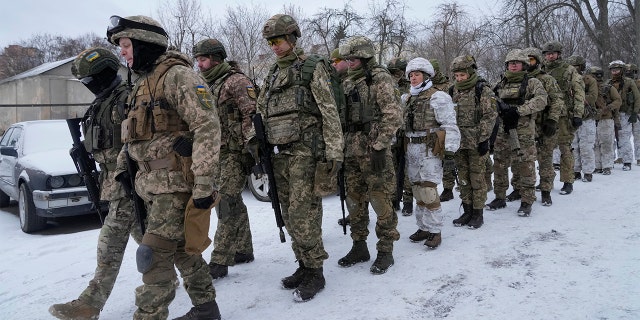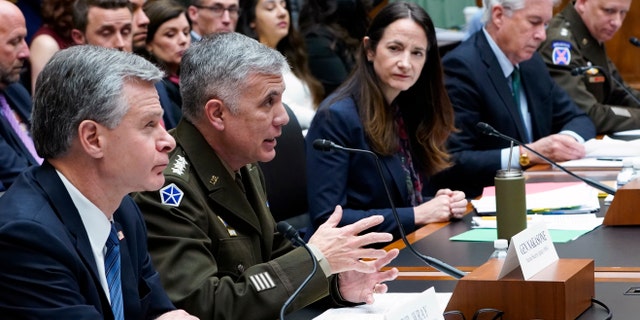What Conflicts Continue as Russia Moves to Dominate Again Russia Economic Today
NEWYou can at present listen to Flim-flam News manufactures!
United states intelligence officials in January assessed that Russia did "not desire a direct conflict with U.South. forces," merely instead, sought "U.Southward. recognition" of its "claimed sphere of influence" over much of the erstwhile Soviet Marriage.
The Office of the Manager of National Intelligence on Tuesday released its 2022 annual threat assessment, which was submitted in early February. The assessment simply includes intelligence through the end of January—weeks before Russian federation launched its multi-front war against Ukraine.
RUSSIA INVADES UKRAINE: LIVE UPDATES
The intelligence community'southward assessment states that Russia "volition remain an influential ability and a formidable challenge to the United States amidst the changing geopolitical landscape during the next decade."
The IC assessed that Russian federation will continue to pursue its interests in "competitive and sometimes confrontational and provocative means."
The IC, at the fourth dimension, said Russian federation would press "to dominate Ukraine and other countries in its 'near-abroad,' while exploring possibilities to achieve a more stable relationship with Washington."

Gutted cars post-obit a dark air raid in the village of Bushiv, 40 kilometers westward of Kyiv, Ukraine, Friday, March four, 2022. (AP Photo/Efrem Lukatsky) (AP Photo/Efrem Lukatsky)
"Nosotros appraise that Russian federation does not desire a direct conflict with U.Due south. Forces," the IC assessed in January. "Russia seeks an accommodation with the United states of america on mutual noninterference in both countries' domestic affairs and U.South. recognition of Russia's claimed sphere of influence over much of the former Soviet Spousal relationship."
The intelligence customs explained that Russian officials have long believed that the United States is trying to undermine Russia, "weaken" Russian President Vladimir Putin, and "install Western-friendly regimes in the former Soviet states and elsewhere,"—moves, the IC said, Russian officials "conclude gives Russia leeway to retaliate."
President Biden, in the weeks leading up to Russia's Feb. 24 invasion of Ukraine, and in the thirteen days since Putin launched the war, has maintained that U.S. forces volition not fight inside Ukraine against Russia. Instead, the United States has deployed thousands of troops to Eastern Europe with the intent of defending NATO allies.
And while the Biden administration and its European allies and partners continue to provide armed services assist to Ukraine, the West has, so far, ruled out a no-fly zone over Ukraine, saying enforcing i would put the U.S. and NATO in direct confrontation with Russian federation and would expand the conflict.

Firefighters effort to extinguish a fire after a chemic warehouse was hitting by Russian shelling on the eastern frontline nigh Kalynivka village on March 08, 2022, in Kyiv, Ukraine. (Photograph by Chris McGrath/Getty Images)
At the time of the cess, Russia had not nevertheless invaded Ukraine. The intelligence community, at the time said Russian federation was continuing to "prepare for a military attack against Ukraine, with well over 100,000 troops massed almost the Ukraine border, including Russian military forces in Belarus, occupied-Crimea, and the separatist forces in Eastern Ukraine."
The intelligence community assessed that Moscow would "go on to employ an array of tools to accelerate its ain interests or undermine the interests of the U.s. and its allies."
RUSSIA-UKRAINE WAR: INTEL OFFICIALS PREDICT 'UGLY' WEEKS AHEAD AS PUTIN DOUBLES DOWN
"These volition be primarily military, security, and intelligence tools, with economic cooperation playing a smaller role," the IC stated. "We expect Moscow to insert itself into crises when Russia's interests are at stake, the anticipated costs of action are low, or information technology sees an opportunity to capitalize on a power vacuum."
The assessment added that Russian federation "probably volition proceed to expand its global military, intelligence, security, commercial, and energy footprint and build partnerships aimed at undermining U.S. influence and boosting its own."
Meanwhile, the U.S. intelligence community assesses that Russia will remain "the largest and near capable" rival in weapons of mass devastation to the United States "for the foreseeable future," as it "expands and modernizes its nuclear weapons capabilities and increases the capabilities of its strategic and nonstrategic weapons."
"Russia also remains a nuclear-material security concern," the IC reported, noting that Russia "views its nuclear capabilities as necessary for maintaining deterrence and achieving its goals in a potential disharmonize against the United States and NATO," and sees a "credible nuclear weapons deterrent as the ultimate guarantor of the Russian Federation."
The intelligence community stated that Russia is continuing its evolution of long-range nuclear-capable missile and underwater commitment systems meant to "penetrate or bypass U.S. missile defenses."
Russia-UKRAINE WAR: WHITE HOUSE SAYS TO Set up FOR A 'VERY LONG, DIFFICULT ROAD AHEAD'
"Russia is expanding and modernizing its big, diverse, and modern set of nonstrategic systems, which are capable of delivering nuclear or conventional warheads," the report states, adding that Moscow believes such systems "offer options to deter adversaries" and "control the escalation of potential hostilities."
The intelligence community likewise establish that Russia believes the expansion and modernization of its nonstrategic systems could "counter U.South. and allied troops well-nigh its edge."
The intelligence community also assessed that Russia would remain a "top cyber threat" in 2022, every bit it refines and employee its espionage, influence, and assail capabilities.

Members of Ukraine's Territorial Defense Forces. (AP Photograph/Efrem Lukatsky) (AP Photo/Efrem Lukatsky)
"We assess that Russia views cyber disruptions every bit a foreign policy lever to shape other countries' decisions, as well every bit a deterrence and armed services tool," the report states.
The intelligence customs institute that Russia is particularly focused on improving its ability "to target critical infrastructure, including underwater cables and industrial command systems" in the United States, besides as in U.Southward. allied and partner countries. The IC found that Russia'south successful compromise of that infrastructure would demonstrate Russia'due south "ability to impairment infrastructure during a crisis."
The IC, at the fourth dimension, said Russia is as well using cyber operations to "attack entities it sees as working to undermine its interests or threaten the stability of the Russian Authorities."
"Russia attempts to hack journalists and organizations worldwide that investigate Russian Government activeness and in several instances, has leaked their information," the report states.
This calendar week, New York country said it is facing "increased risk" of cyberattacks from Russian retaliators, with NYPD officials warning that New York Urban center is currently on "ultra-high alert."
The IC also institute that Russia presents "one of the virtually serious foreign influence threats to the Us, using its intelligence services, proxies, and broad-ranging influence tools to try to divide Western alliances, and increment its sway around the world, while attempting to undermine U.S. global standing, amplify discord inside the U.s., and influence U.S. voters and conclusion making."
"We assess that Moscow probably will build on these approaches to try to undermine the Usa as opportunities arise—Russia and its influence actors are proficient at capitalizing on current events in the U.s.a. to push Moscow-friendly positions to Western audiences," the assessment states.

National Security Agency Manager Gen. Paul Nakasone, 2nd from left, testifies on Capitol Hill in Washington, Tuesday, March 8, 2022, during a House Permanent Select Commission on Intelligence hearing on worldwide threats. Joining him at the witness tabular array is, from left, FBI Director Christopher Wray, Manager of National Intelligence Avril Haines, Central Intelligence Agency Managing director William Burns, and Defense Intelligence Bureau Manager Lt. Gen. Scott Berrier. ((AP Photo/Susan Walsh))
The IC in Jan besides institute that Moscow would continue "online influence operations" in the United States, and in other countries, similar Belarus and Ukraine, and other countries of key Russian interest."
The annual threat assessment was released just after Managing director of National Intelligence Avril Haines and other peak U.Southward. intelligence officials testified earlier the House Intelligence Committee and warned that the coming weeks of Putin's state of war volition get "ugly" as he takes an even more ambitious arroyo to endeavour to take over Ukraine.
PUTIN'S DESIRE TO BRING Back SOVIET UNION, Advanced AGE DRIVING INVASION, UKRAINE CAUCUS CO-CHAIR SAYS
"Our analysts assessed that Putin is unlikely to be deterred by such setbacks and instead may escalate, essentially doubling down to achieve Ukrainian disarmament neutrality to foreclose it from farther integrating with the U.S. and NATO if it doesn't accomplish some diplomatic negotiation," Haines testified.
Haines noted that while Putin may have a tougher opinion now, he may be lowering his expectations in terms of possible outcomes every bit he sees more and more obstacles in his way.
"What he might be willing to have every bit a victory may change over time, given the significant costs he is incurring," Haines said.
Meanwhile, the annual threat assessment was not only limited to Russian federation, but addressed other global threats facing the United States for 2022, including Communist china, North Korea, Iran and more.
"In the coming twelvemonth, the Us and its allies will face an increasingly complex and interconnected global security environment marked by the growing specter of great ability competition and conflict, while commonage, transnational threats to all nations and actors compete for our attention and finite resources," the intelligence assessment states.
The assessment states that Mainland china is increasingly a "well-nigh-peer competitor, challenging the United States in multiple arenas—particularly economically, militarily, and technologically—and is pushing to alter global norms and potentially threatening its neighbors."
And equally many have said Putin's invasion of Ukraine has emboldened Cathay with regard to its ambition to take Taiwan, the intelligence community warned that Beijing is using a coordinated approach to compel neighbors to "acquiesce" to its preferences, "including its territorial and maritime claims and assertions of sovereignty over Taiwan."
"Beijing will press Taiwan to move toward unification and will react to what it views equally increased U.S.– Taiwan engagement," the IC states. "We expect that friction will grow as China continues to increase military machine activity effectually the isle, and Taiwan's leaders resist Beijing's pressure for progress toward unification."
CLICK HERE TO Go THE Flim-flam NEWS APP
The assessment added that China's "command over Taiwan probably would disrupt global supply bondage for semiconductor chips considering Taiwan dominates production."
"In the S China Sea, Beijing volition continue to apply growing numbers of air, naval, and maritime law enforcement platforms to intimidate rival claimants and betoken that China has effective command over contested areas," the assessment states. "China is similarly pressuring Nihon over contested areas in the East China Body of water."
The IC also assessed that China presents "the broadest, most agile, and persistent cyber espionage threat to U.South. Government and individual sector networks."
"China'due south cyber pursuits and export of related technologies increment the threats of attacks against the U.S. homeland, suppression of U.Southward. web content that Beijing views equally threatening to its control, and the expansion of applied science-driven authoritarianism globally," the report states.
The intelligence customs besides plant that "instability and conflicts keep to threaten U.Due south. persons and interests," some of which have "direct implications for U.S. security."
"For example, the Taliban takeover of Transitional islamic state of afghanistan threatens U.S. interests, including the possibility of terrorist safe havens re-emerging and a humanitarian disaster," the assessment states.
Source: https://www.foxnews.com/politics/russia-does-not-want-a-direct-conflict-with-us-forces-2022-intelligence-community-assessment-finds
0 Response to "What Conflicts Continue as Russia Moves to Dominate Again Russia Economic Today"
Post a Comment